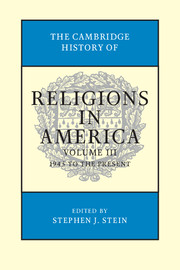Book contents
- Frontmatter
- SECTION I THE POSTWAR RELIGIOUS WORLD, 1945 AND FOLLOWING
- SECTION II CONTROVERSIAL ISSUES IN TRANSITIONAL TIMES
- SECTION III THE WORLD’s RELIGIONS IN AMERICA
- SECTION IV RELIGIOUS AND CULTURAL CONFLICT IN AMERICA
- 21 Race, Religion, and Theological Discourse
- 22 American Religion’s Fascination with Sex
- 23 Women and Religion in Modern America
- 24 “Cults” in America: Discourse and Outcomes
- 25 Religious Tensions in a Changing World
- SECTION V NEW AND CONTINUING RELIGIOUS REALITIES IN AMERICA
- SECTION VI CONCLUDING ESSAYS
- Index
- References
24 - “Cults” in America: Discourse and Outcomes
from SECTION IV - RELIGIOUS AND CULTURAL CONFLICT IN AMERICA
Published online by Cambridge University Press: 28 July 2012
- Frontmatter
- SECTION I THE POSTWAR RELIGIOUS WORLD, 1945 AND FOLLOWING
- SECTION II CONTROVERSIAL ISSUES IN TRANSITIONAL TIMES
- SECTION III THE WORLD’s RELIGIONS IN AMERICA
- SECTION IV RELIGIOUS AND CULTURAL CONFLICT IN AMERICA
- 21 Race, Religion, and Theological Discourse
- 22 American Religion’s Fascination with Sex
- 23 Women and Religion in Modern America
- 24 “Cults” in America: Discourse and Outcomes
- 25 Religious Tensions in a Changing World
- SECTION V NEW AND CONTINUING RELIGIOUS REALITIES IN AMERICA
- SECTION VI CONCLUDING ESSAYS
- Index
- References
Summary
The English word “cult” is derived from the Latin cultus, referring to “care,” “adoration,” or “worship.” Therefore, the descriptive definition of “cult” as utilized by religious studies scholars and anthropologists refers to an organized system of worship focused on an adored object. The object of adoration is typically regarded as partaking of a sacred, unseen, and spiritual reality that is believed to have a powerful effect on human beings. In the United States since the beginning of the twentieth century, however, the term “cult” has been used to refer to religious groups that are feared and hated. Every culture and historical period has had stigmatized, marginal, and dissenting religious groups and movements, but the application of the term “cult” to such groups is relatively recent. Usually these religious groups are misunderstood by their critics, and their dangers are magnified in the popular imagination.
Particularly since the 1970s the term “cult” conveys a stereotype involving what can be called the “myth of the omnipotent leader” in combination with the “myth of the passive and brainwashed follower.” “Myth” is used popularly to refer to a story that is untrue, but a religious studies understanding of myth is also applicable in this case. In religious studies a myth is a narrative that conveys explanations as well as dearly held values. The “myth of the omnipotent leader” and the “myth of the passive and brainwashed follower” provide simplistic explanations of why stigmatized groups attract members.
- Type
- Chapter
- Information
- The Cambridge History of Religions in America , pp. 511 - 531Publisher: Cambridge University PressPrint publication year: 2009



